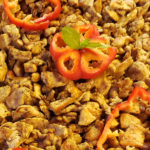Mustafa Al Mustafa:
Owner, Mustafa Syrian Kitchen
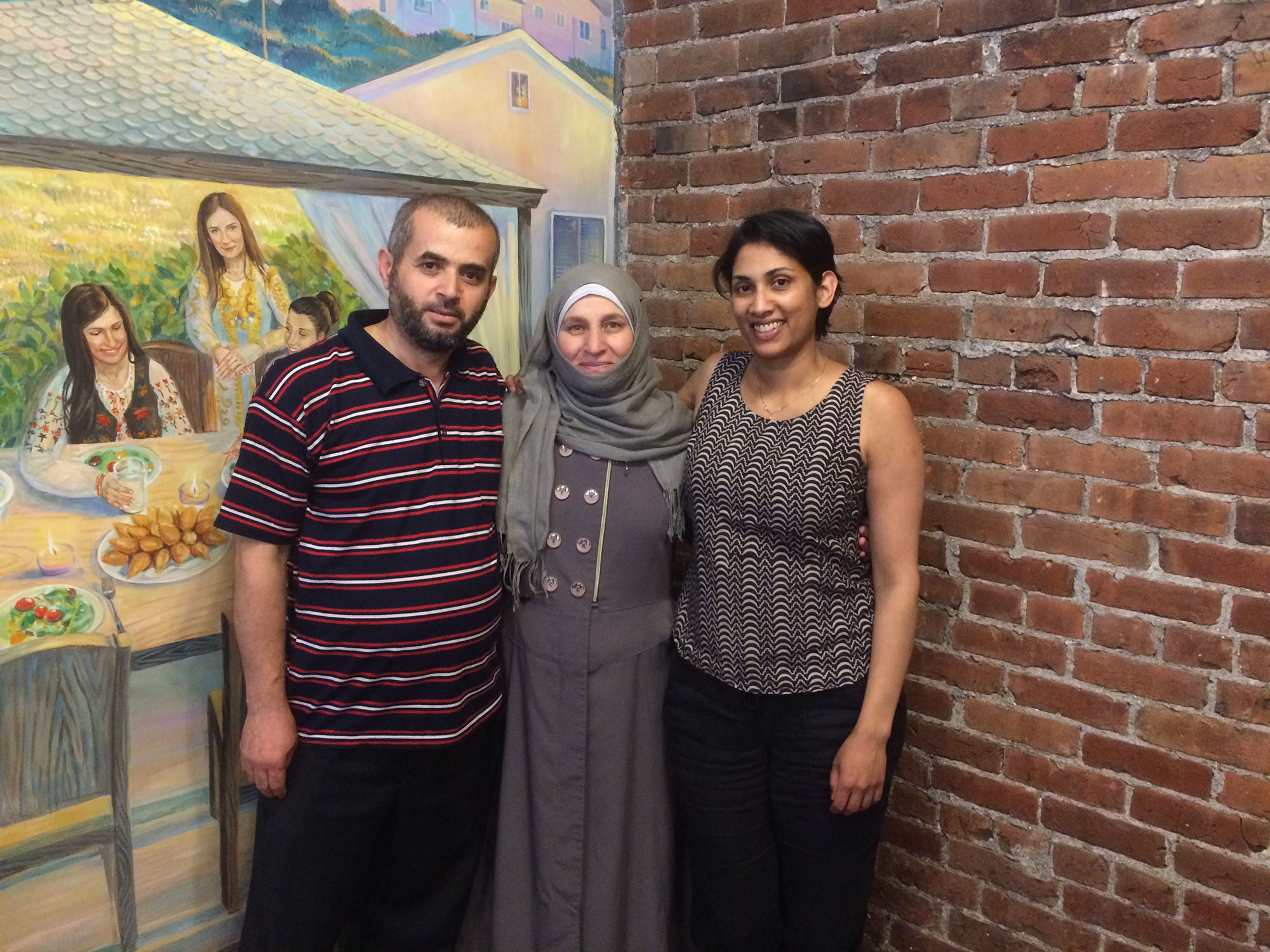
“When I went to Project Feast, I learned a lot about the food, people, everything.”
Project Feast alum Mustafa Al Mustafa and his family opened their food truck in Vashon Island just as pandemic lockdowns were beginning, and their traditional Syrian dishes are savored by locals and visitors alike. Mustafa’s Project Feast apprenticeship in 2018 was a key step in the journey to own this thriving food business.
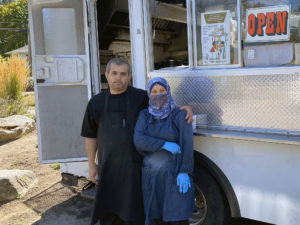
Mustafa and Jamila at their food truck on Vashon Island.
Mustafa Al Mustafa looks up at the evergreens surrounding his busy food truck in the heart of Vashon Island and points out the similarities between his home now in the Pacific Northwest and his hometown in northwest Syria: The farm near Idlib where he grew up is also covered in trees – at least 2,000 of them. They are olive, fig, plum and cherry trees, not firs, but Mustafa says the two villages on opposite sides of the world are more alike than not.
“It’s very quiet here, too,” says Mustafa, who moved to Vashon in 2017 with his wife, Jamila Aldahir, and their five children. “I like the small town. It is different, but it is the same. You can see green everywhere.”
From their food truck, Mustafa Syrian Kitchen, his family dishes up flavors of home: fava beans with yogurt sauce, chicken shawarma, lamb kebabs, baklava. They opened in March 2020, right as pandemic lockdowns were beginning, and discovered Vashon Island has a hearty appetite for the foods Mustafa and Jamila have loved their whole lives. Business was brisk from the start, with a steady stream of locals stopping by to pick up lunch or dinner. They also cater special events like weddings and sell their delicious Syrian pastries in Vashon Island stores.
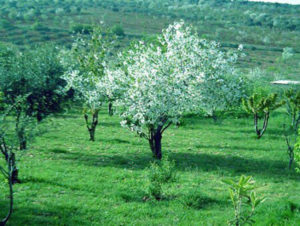
Cherry trees on Mustafa’s family land in northwest Syria.
Before leaving Syria, they didn’t imagine they would one day own a food business. Mustafa was an accountant and Jamila took care of their home and growing family. But in 2012, a cancer diagnosis for their then-4-year-old daughter – combined with civil war violence that made reliable medical care impossible – forced the family to seek refuge and doctors in Turkey. After they arrived in the Seattle area in 2016, sharing Syrian food became a big part of their work and their lives. And in 2018, Mustafa’s apprenticeship with Project Feast helped lay the foundation for their thriving business today.
“At Project Feast, I learned how to work with the customer, with the staff in the kitchen and some of the language,” says Mustafa, who heard about the apprenticeship from a friend. “I learned about the world, about different countries and different foods. And I like the cooking.”
Early in the apprenticeship, he wanted to teach the students from Mexico and Ukraine how to make kibbeh, which is a classic Syrian dish of bulgur stuffed with spiced ground meat and onions. Kibbeh has been one of his favorite foods since childhood, and he remembers his mother making giant batches for their bustling home full of siblings and cousins. But before Project Feast, he was more of an expert at eating kibbeh, not making it.
Jamila, on the other hand, has been making kibbeh since her mother started teaching her to make traditional Syrian dishes when she was a child. “I’d watch what she does when she cooks, and I’d ask her a lot of questions,” Jamila says. “I liked to cook from when I was young.”
So, when Mustafa decided to introduce his Project Feast classmates to kibbeh, Jamila gave him a lesson. “Just one time. He’s very smart,” she says. The other students loved it, along with his baklava and dolmas. “They wanted to eat it every day,” Mustafa says.
From his classmates, Mustafa also learned to make tacos from Mexico and injera from Somalia. “We worked together. I helped them and they helped me,” he says. “We took our food together every day – a big table with Syrian food, Mexican food, Indian food, American food. I always remember our friends there.”
“It is a very good program for the refugee,” he says. “When refugees come to the USA, they don’t know anything about the USA. When I went to Project Feast, I learned a lot about the food, people, everything.”
After the apprenticeship, Mustafa stayed on as a member of Project Feast’s staff for a few months, and then he worked in the kitchen at the Vashon Community Care Center. Since he opened the food truck in 2020 with Jamila and their sons, it’s been easier for him to have the flexibility to schedule his daughter’s doctor appointments in Seattle. Now 14, her cancer is in remission, but she continues to need regular medical care.
Mustafa savors the connection with the Vashon Island community that comes through sharing his family’s food. In addition to their regular island customers, the food truck draws fans from Seattle, Olympia and Portland. “They hear about us and come to visit the island and to get our food,” he says. “A lot of people know Mediterranean food, and maybe 10 people or more have visited Syria.”
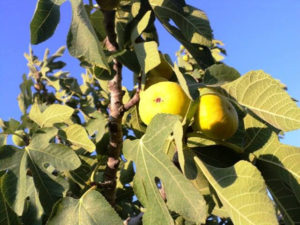
Figs growing on Mustafa’s family’s land in Syria.
But some flavors of home simply can’t be found in the Pacific Northwest. “I miss the figs always. There are no good figs here,” Mustafa says. “And we have a very special olive oil in Idlib.” He stays in contact with family in Syria and shares stories from the food truck experiences.
“They’re very happy for us, but we are very scared for them,” he says. The region around Idlib is controlled by the Syrian opposition government, but the civil war continues. “There is no [Bashar al-]Assad or Russia in Idlib, but they bomb every day, every hour. It’s very, very scary. There’s no water, no medicine, no city electricity, no food.”
Two of his brothers and his mother still live in his hometown and work their land. “The borders are closed,” Mustafa says. “They don’t have anywhere to go.”
But even without fresh figs, the close-knit community of Vashon Island feels like home. “When we came here, we didn’t know anything about Vashon and we didn’t know anybody here,” Mustafa says. “Everybody would ask, ‘What do you need?’ They helped us with everything.”
Now Mustafa and his family find opportunities to give back to the community, including through supporting the Vashon Maury Community Food Bank. “We want to connect with people on Vashon, to make people happy,” Jamila says. “Inshallah [God willing] we will someday be able to help our family still struggling in Syria.”
– Interview and writing by Denise Clifton, Tandemvines Media
Mustafa Syrian kitchen:
19021 Vashon Hwy SW.
Phone: 206-458-2450
Food truck Facebook page | Catering website
Chicken Shawarma
Ingredients
- 2 lbs. chicken breast
- 2 cups vegetable oil
- 6 garlic cloves
- 1 tbsp salt
- 1 tbsp each coriander, cumin and black pepper
- 2 tbsp paprika
Instructions
- 1. Slice chicken into small, thin pieces. Marinate with oil, garlic, spices and salt.
- 2. Cook on grill until golden brown. Serve hot with rice or pita bread.
Falafel
Ingredients
- 2 cups dried chickpeas (or 30 oz canned chickpeas)
- 5 garlic cloves
- ¼ bunch mint optional
- ¼ bunch parsley optional
- 1 tbsp salt
- 2 tbsp coriander
- 1 tbsp cumin
- 1 tbsp paprika
- 2 liters vegetable oil
Instructions
- 1. If using dried chickpeas, soak in water overnight. If using canned chickpeas, drain and rinse. Place in a food processor along with parsley, mint and the garlic, spices and salt. Pulse until thoroughly mixed.
- 2. Form into small golf-ball-sized balls (about 2 tbsp of filling for each).
- 3. Prepare oil for deep frying and fry falafels until golden brown.
- 4. Serve hot over rice or with pita bread.
Hummus
Ingredients
- 1 lb. boiled chickpeas
- 3 garlic cloves
- 1/2 cup of tahini
- 1 tbsp lemon juice
- 1 tsp cumin
- 1/2 tbsp salt
Instructions
- Blend the chickpeas, tahini, lemon juice, garlic cloves and salt. Mix together until hummus is thick.

